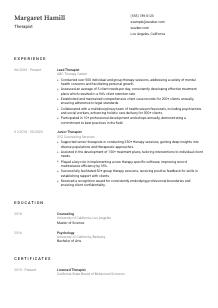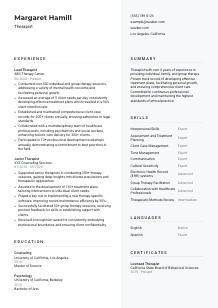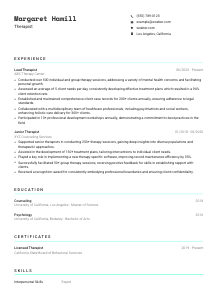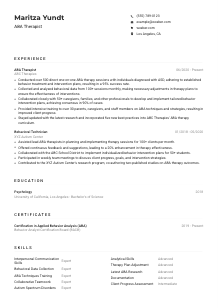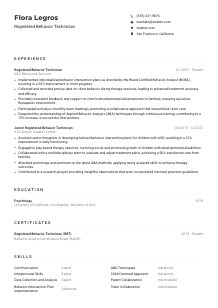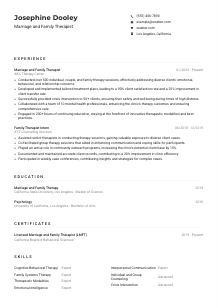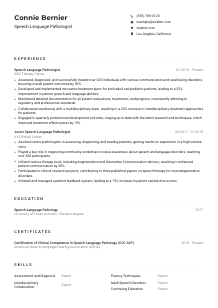Therapist CV Example
Helping minds, but your CV feels out of sync? Tune into this Therapist CV example, composed with Wozber free CV builder. Discover how you can express your empathy and expertise to align with job aspirations, guiding your career path to a place of healing and growth!
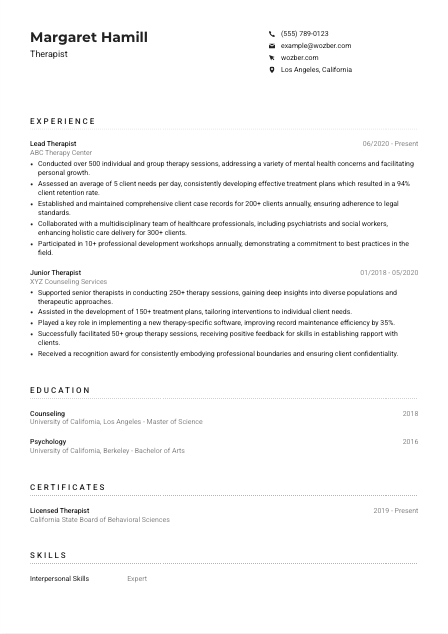
How to write a Therapist CV?
Hello, aspiring Therapist! Crafting a CV that stands out is more than just a necessity in the competitive mental health field; it's your ticket to showcasing your unique blend of empathy, expertise, and dedication to fostering growth and healing. With Wozber's free CV builder, you're about to embark on a journey to tailor your CV to the beat of your professional heart, making it resonate with your dream job's requirements.
So, are you ready to weave your qualifications, experiences, and personal flair into a narrative that not only speaks to hiring managers but sings to them? Let's dive into the art of fine-tuning your Therapist CV with precision and passion.
Personal Details
The Personal Details section is more than just standard contact information; it's the first brushstroke on your canvas, setting the tone for your CV's masterpiece. Here's how to make it Therapist-specific, ensuring every detail contributes to a picture of professionalism and sincerity.
1. Boldly State Your Name
Begin with your name, your personal brand, in a clear, legible font. Making it slightly more prominent than the rest paves the way for an unforgettable introduction.
2. Mirror the Desired Title
Adding the job title "Therapist" below your name instantly aligns your CV with the role, signaling to hiring managers that you're exactly what they're looking for. This simple act of alignment brings your CV into harmony with the job description.
3. Make Contact Details Count
- Phone Number: Ensure it's correct; a misplaced digit can mean a missed opportunity.
- Professional Email: Choose an email that reflects professionalism, typically your firstname.lastname@email.com, avoiding nicknames or fanciful expressions.
4. Location, Location, Location
Including "Los Angeles, California" in your contact information directly connects you to the local aspect of the job, which is essential given the job's location requirement. It's like saying, 'I'm already here, ready to make a difference'.
5. A Digital Handshake
Consider adding a professional LinkedIn profile, ensuring it's polished and mirrors your CV. This acts as your virtual handshake with potential employers.
Takeaway
In essence, the Personal Details section is your CV's forefront, a concise yet compelling introduction that whispers of your professionalism and keenness to serve as a Therapist. By crafting it with care, you're laying down the welcoming mat for hiring managers, inviting them to delve deeper into your narrative.





Experience
In the tapestry of your career, the Experience section stands out, each thread intricately woven with your professional journey. Let's tailor it specifically to the Therapist role, showcasing your abilities to facilitate healing.
- Conducted over 500 individual and group therapy sessions, addressing a variety of mental health concerns and facilitating personal growth.
- Assessed an average of 5 client needs per day, consistently developing effective treatment plans which resulted in a 94% client retention rate.
- Established and maintained comprehensive client case records for 200+ clients annually, ensuring adherence to legal standards.
- Collaborated with a multidisciplinary team of healthcare professionals, including psychiatrists and social workers, enhancing holistic care delivery for 300+ clients.
- Participated in 10+ professional development workshops annually, demonstrating a commitment to best practices in the field.
- Supported senior therapists in conducting 250+ therapy sessions, gaining deep insights into diverse populations and therapeutic approaches.
- Assisted in the development of 150+ treatment plans, tailoring interventions to individual client needs.
- Played a key role in implementing a new therapy‑specific software, improving record maintenance efficiency by 35%.
- Successfully facilitated 50+ group therapy sessions, receiving positive feedback for skills in establishing rapport with clients.
- Received a recognition award for consistently embodying professional boundaries and ensuring client confidentiality.
1. Break Down the Job Description
Start by dissecting the job description. Note the requirements: "experience in a clinical setting", "proficiency in using therapy-specific software", and collaboration skills. These are your golden tickets to ATS optimisation.
2. Structure with Precision
Order your roles starting with the most recent. For each, state your job title, the name of the establishment, and your tenure there. This structure not only speaks to your career's chronology but also to its depth and breadth.
3. Triumphs and Trials
For each role, select achievements and responsibilities that echo the job's needs. If you've conducted over 500 therapy sessions or spearheaded the integration of a new EHR system, here's where those victories shine, proving your capability and dedication.
4. The Magic of Numbers
Quantify your successes wherever possible. Did you achieve a 94% client retention rate, or work with a team to enhance care for over 300 clients? These numbers speak volumes, offering tangible proof of your impact.
5. Relevancy Is Key
Tailor your experiences to the role. While your stint as a barista may have honed your people skills, focus on the experiences directly related to therapy and client care. Every point should aim directly at the heart of what makes you an outstanding Therapist.
Takeaway
Your Experience section is the narrative of your career, a testament to your growth, resilience, and capacity for impact. By aligning each entry with the job description, you're painting a picture of a Therapist poised for success. It's your time to shine; let your experiences do the talking.
Education
Education is the bedrock upon which your career is built, a testament to your dedication and pursuit of knowledge. For a Therapist, it's particularly important to highlight your specific educational qualifications in line with job requirements.
1. Identify Key Educational Criteria
Pinpoint what the job specifically seeks. With a requirement for a "Master's or Doctoral degree in Counseling, Psychology, or a related field," your relevant degrees should be front and center, showcasing your academic commitment to your profession.
2. Layout Matters
Present your educational background succinctly: the degree, field of study, institution, and graduation date. This clarity not only makes it easy for ATS systems to recognize your qualifications but also for hiring managers to see you tick off key criteria straight away.
3. Degree Alignment
Ensure the degrees listed match the job's requirements. If you've earned a "Master of Science in Counseling" and a "Bachelor of Arts in Psychology", these should be prominently displayed to highlight your fitting educational background.
4. Supplementary Education
If you've taken additional courses or certifications that bolster your qualifications as a Therapist, consider listing them if they add value to your candidacy, especially if you're in the early stages of your career.
5. Honors and Achievements
Where applicable, include any honors or recognitions you've received during your academic journey. While more critical at the onset of your career, they can still add a layer of distinction to your CV.
Takeaway
The Education section spotlights your foundational knowledge and commitment to your profession. Tailoring it to match precisely what the employer is looking for is like handing them a map to your potential. Let your educational achievements guide them to see you as the perfect candidate.
Certificates
In the constantly evolving field of therapy, certifications aren't just achievements; they're markers of your commitment to growth, learning, and excellence. Let's spotlight them in a way that speaks directly to your role as a Therapist.
1. Examining the Job Requirements
Even if not explicitly mentioned, certifications like "Licensed Therapist" in California can underscore your readiness and dedication. These align with the implicit expectations of the role, particularly regarding licensure and specialized expertise.
2. Selective Highlighting
Focus on certifications that resonate most with the Therapist role, emphasizing quality over quantity. Listing your "Certified Mental Health Professional" certification, for example, directly speaks to your expertise and commitment.
3. Date Details
For certifications, especially those that require renewal, including dates can be critical. This demonstrates not only your achievement but also your ongoing commitment to maintaining professional standards.
4. Always Evolving
The field of mental health and therapy is ever-changing. Regularly updating your certifications and pursuing additional ones show a commitment to staying at the forefront of your field, an attractive quality to potential employers.
Takeaway
The right certifications illuminate your path in the therapy profession, shining a light on your expertise, dedication, and the continuous journey of learning. By carefully selecting which certifications to include, you underscore your readiness to excel and grow within the mental health field.
Skills
Your skills section is more than a list; it's a finely curated collection of your professional capabilities. For a Therapist, this is where you convey the depth of your empathy, technical proficiency, and ability to connect and transform lives.
1. Dial Into the Job Specs
Extract both explicit and implied skills from the job description. Skills like "strong interpersonal skills" and "proficiency in therapy-specific software or EHR systems" are your guideposts for what to include.
2. Matching Your Mastery
Reflect on your hard and soft skills, aligning them with those highlighted in the job posting. Showcasing your expertise in "Assessment and Treatment Planning" or your proficiency with "EHR systems" directly links your abilities to the role's demands.
3. Polish and Present
Instead of an overwhelming list, focus on the skills that make you stand out as a Therapist. Present them neatly, ensuring they capture the hiring manager's attention and speak directly to your capability to excel in the role.
Takeaway
Consider your skills section as the highlight reel of your professional abilities. It's your chance to impress upon the hiring manager that you're not just capable but uniquely equipped for the challenges and opportunities of the Therapist role. Choose each skill as though it's a key that unlocks the doors to new possibilities in your career.
Languages
In therapy, communication is key. Your ability to connect with, understand, and empower clients can be significantly enhanced by your linguistic capabilities. Let's ensure your languages section speaks volumes about your readiness to serve a diverse clientele.
1. Clarify the Job's Language Requirements
With "English proficiency" highlighted as a crucial skill for the position, place your proficiency with the English language at the forefront of this section. It directly aligns with the job's specified need.
2. Highlight Your Linguistic Range
In addition to meeting the explicit requirements, showcasing additional languages, like Spanish, illustrates your readiness to connect with a broader range of clients, an invaluable asset in diverse Los Angeles.
3. Rate Your Fluency Honestly
Be transparent about your proficiency levels, ensuring you can genuinely offer the level of communication required. From "Native" to "Fluent" or "Intermediate," clarity here sets realistic expectations and showcases your integrity.
4. Understanding the Role's Demand
In a role that prioritizes clear communication and empathy, your linguistic skills can be a unique advantage, particularly in a multicultural metropolis like Los Angeles. It's not just about speaking a language; it's about connecting hearts and minds.
Takeaway
Each language you speak is a testament to your capacity to connect with more stories, more backgrounds, and more lives. As you prepare to step into a role that demands profound understanding and compassion, let your linguistic skills underscore your readiness to meet every client in their moment of need. Language is therapy in its own right, offering solace, understanding, and connection. Embrace your multilingual abilities as tools of the trade in the hands of a skilled Therapist.
Summary
A compelling summary is like the opening paragraph of a bestselling novel; it draws the reader in, enticing them to learn more. For a Therapist, this is your space to encapsulate your dedication, expertise, and the unique contributions you bring to the role.
1. Absorb the Role's Core
Immerse yourself in understanding the essence of the Therapist position. Reflect on the responsibilities and requirements, letting them guide the creation of your summary.
2. Start with a Strong Introduction
Kick off your summary with a powerful statement that encapsulates your professional identity. 'Therapist with over 6 years of experience in providing individual, family, and group therapy' not only defines who you are but also your breadth of experience.
3. Address Key Competencies
Incorporate a few of your most significant achievements and skills, linking them back to the job description. This is where your specialized skills in creating treatment plans, maintaining case records, and your commitment to professional development shine. It's about painting a picture of not just your qualifications but your impact.
4. Keep It Snappy
While your summary should be comprehensive, brevity is key. Aim for 3-5 impactful lines that leave the hiring manager intrigued and eager to learn more about you. It's the hook that draws them into the story of your professional journey.
Takeaway
Your summary is the prism through which the hiring manager first views you. By tailoring it to the Therapist role, you ensure that first glimpse reflects a professional ready to make meaningful impacts in the lives of clients. Consider your summary as the headline of your CV; make it captivating, clear, and irresistibly aligned with the role you aspire to fill.
Embarking on Your Therapist Journey
Congratulations on crafting a Therapist CV that speaks to the core of who you are as a professional. With these guiding steps and Wozber's free CV builder at your disposal, you've turned your CV into a beacon, signaling your readiness, dedication, and unique capability to contribute to the mental health field. From leveraging ATS-friendly CV templates to ensuring ATS optimisation with an ATS CV scanner, you're not just ready for the job market – you're poised to make a profound difference.
Remember, your CV is more than a document; it's a narrative of your passion, commitment, and the boundless potential you bring to the therapeutic profession. Dive into your job search with confidence, and let your CV open doors to a career filled with growth, challenges, and the joy of making a positive impact in the lives of those you serve.

- Master's or Doctoral degree in Counseling, Psychology, or a related field.
- State licensure as a Therapist or ability to obtain licensure within 6 months of hire.
- Minimum of 2 years of experience in a clinical setting, preferably with diverse populations.
- Proficiency in using therapy-specific software or electronic health record (EHR) systems.
- Strong interpersonal skills, empathetic demeanor, and the ability to establish rapport with clients.
- English proficiency is a key skill for this position.
- Must be located in Los Angeles, California.
- Conduct individual, family, or group therapy sessions to address client mental health concerns or facilitate personal growth.
- Assess client needs, develop treatment plans, and maintain comprehensive client case records in adherence to legal and ethical standards.
- Collaborate with other healthcare professionals, such as psychiatrists and social workers, to ensure comprehensive care for clients.
- Participate in ongoing professional development and regularly review therapeutic methods to ensure best practices.
- Maintain strict confidentiality and uphold professional boundaries with clients at all times.





